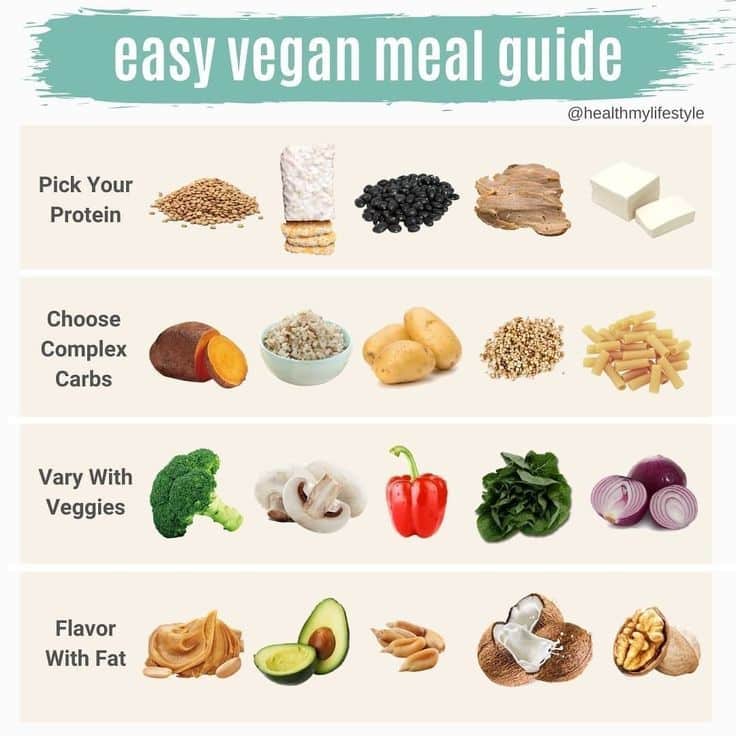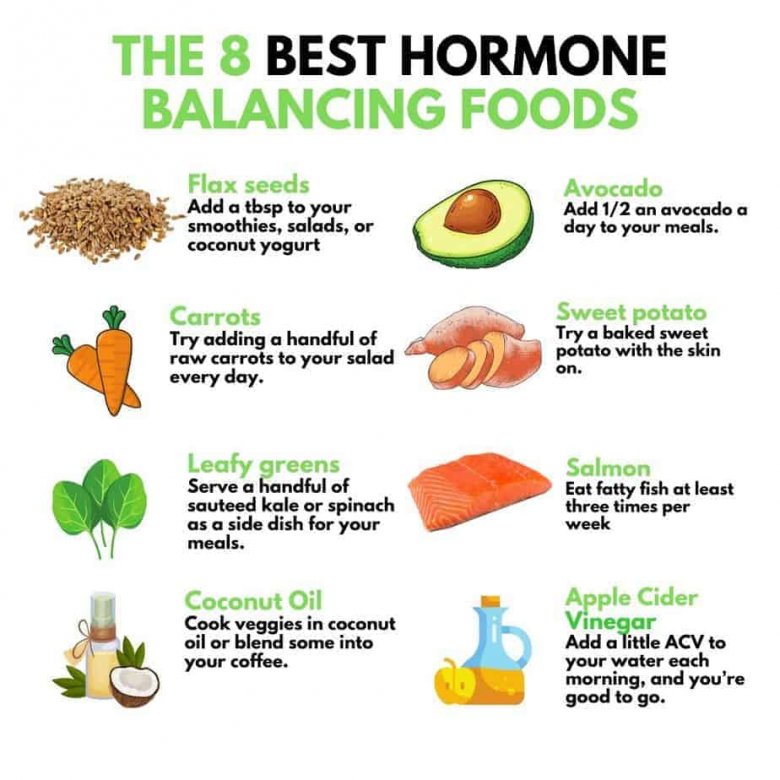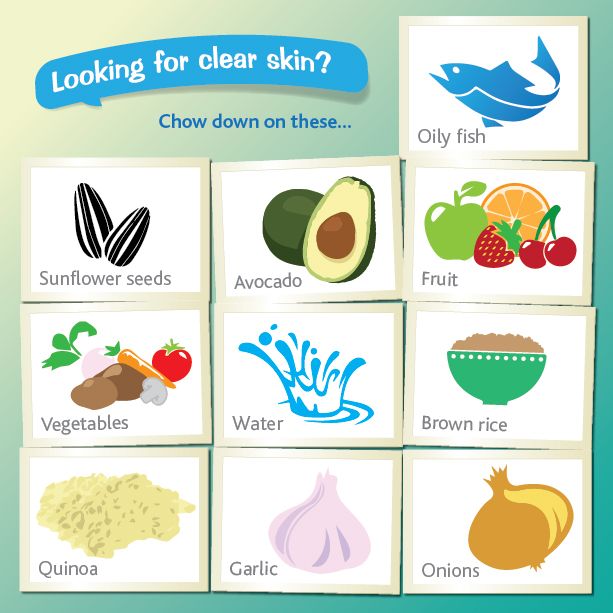Foods For Hormonal Balance
Without a doubt, an anti-inflammatory diet will help curb acne breakouts. You will see the beverage and food suggestions below are all anti-inflammatory foods.
Spearmint Tea
There are studies that show that spearmint tea has anti-inflammatory properties and can help reduce the amount of circulating androgens . The beneficial recommended amount is 2-3 cups per day.
Foods Rich in Zinc
Zinc is a natural DHT-blocker, which is a metabolite of testosterone, thus, lows the increase in sebum production . Foods that have high amounts of zinc are nuts, oysters, and legumes.
Unfortunately, whole grains, even though they contain zinc, also contain phytates which reduce your zinc absorption .
Omega 3 Foods
Since acne is an inflammatory skin disease, omega 3 is the perfect competitor for inflammation . Wild-caught salmon, chia seeds, walnuts, flax seeds are rich in omega 3 fatty acids. Try adding these healthy fats to your daily diet of foods for hormonal balance.
Foods Rich in Antioxidants
On the same note of inflammation, increasing antioxidants can help combat free radicals that increase inflammation . Berries, pomegranate seeds, and beets are some great examples of foods high in antioxidants.
How Do I Clear Hormonal Acne
Acne takes a multi-faceted approach, but you can start with diet. Consider a hormone-supporting diet that eliminates offenders like high GI and inflammatory foods, sugar, alcohol, and dairy. Try adding nutrient-rich foods like colorful produce, whole grains, nuts, and legumes to nourish you from the inside out.
Why Sex Hormones Are Only Part Of The Problem
When was the first time you experienced acne? If youre like most people, it was when you were a teenager, likely going through puberty. Around 90% of adolescents experience acne during puberty.
Because of this, were quick to blame our fluctuating levels of testosterone and estrogen for our acne.
Traditionally, we think of hormonal acne as a by-product of high levels of androgens.
Androgens are sex hormones that promote male characteristics. Testosterone is the primary androgen. Testosterone creates several other hormones, including DHT. DHT is the sex hormone that is most responsible for acne.
DHT is the underlying cause of several male characteristics, including a deepening voice, body hair, muscle growth, and, you guessed it, acne.
DHT is responsible for increasing the amount of sebum oil your sebaceous glands produce. Too much sebum oil can lead to clogged pores, oily skin, and eventually acne.
It makes sense that we typically get acne when were in our adolescent years DHT levels begin to rise and fluctuate during puberty. This leads to extremely oily skin, and, when combined with an inflammatory diet, acne and pimples.
Contrary to what you might think, both men and women have androgens.
That means that both men and women can experience hormonal, DHT-driven acne.
Some experts even recommend taking birth control medication, drinking spearmint tea, or eating a low-protein diet in order to lower testosterone but this is a fundamentally flawed approach .
Don’t Miss: How To Tell You Have Low Testosterone
What You Need To Know About A Hormonal Acne Diet
Hormonal acne is a condition that can cause both physical and emotional discomfort. Heres how you can help your clients eat a hormonal acne diet to improve their symptoms and boost confidence levels.
Acne is a prevalent skin condition and can affect men and women of all ages. Even though its common, many people can get frustrated in their journey towards clear skin, as it can be a complicated matter to uncover the root cause, manage the effects of acne, and reduce scarring.
While there are many powerful dermatology products that are targeted toward fighting acne, what your client puts on their fork can also make a difference.
Studies continue to show that nutrition plays an important role when it comes to treating hormonal acne naturally, so heres how you, as a dietitian, can create a hormonal acne plan to help your clients achieve clear skin.
Why Does Acne Develop

For many including me thinking about teenage acne is a painful exercise. But its worth understanding why acne develops in the first place.
Acne is thought to develop because of a combination of factors: the production of too much oil in the skin, clogged skin pores, bacteria in the skin, and inflammation. Hormonal changes which occur during puberty, or with a condition called polycystic ovary syndrome and the menstrual cycle can have a big impact on acne, because they affect oil production in the skin. Some medications can cause acne , and hair products, makeup, and other products we put on our skin can contribute to clogged pores. Genetic factors, pollution, smoking, and stress have also been suggested as causes or contributors to acne.
And then there remains the possibility that diet matters. Certain foods can promote inflammation throughout the body, and its possible this triggers acne outbreaks. In addition, diet can affect hormones that, in turn, could make acne worse. For example, milk and foods with a high sugar content can cause a rise in insulin levels, altering other hormones that can affect the skin. Some research has linked milk and whey protein with acne.
Despite these possible connections between diet and acne, there is no consensus that changing your diet is an effective way to deal with acne.
Don’t Miss: Alternative To Hormone Replacement Therapy Menopause
Dairy And Hormonal Acne
Dairy is one of the single worst food groups when it comes to hormonal acne.
Why?
The purpose of dairy is to help babies grow. It makes sense that most dairy is extremely high in both IGF-1 and insulin.
Cow, sheep, and goat dairy all have significant amounts of growth hormones in them.
On top of the hormones already found in dairy, many forms of high-lactose dairy, including milk, yogurt, and some cheeses, are extremely insulinogenic, which means they trigger a large insulin response from the body. Even though that slice of cheese might look like a great low-carb option, its actually very likely to trigger a large insulin response from the body.
This means that dairy is double trouble when it comes to hormonal acne: not only does it contains a large amount of IGF-1, it also triggers a spike of insulin when you eat it.
While some dairy, like ghee, is great for acne-prone skin, most dairy is not.
See the Definitive Guide to Dairy and Acne or our Guide to Dairy-Free Milk Alternatives for Acne-Prone Skin for more information.
Top Diet Tips To Control Acne
Everyone’s body is different and a person sticking to one diet may help clear up their acne while the same diet may not work for someone else. Lee suggests maintaining a low-glycemic dietincluding lots of fresh vegetables as well as some fresh fruits, beans, and steel-cut oatsto help minimize pimples. And no matter what, make sure you’re cleansing your skin morning and night, and incorporating benzoyl peroxide, an effective antimicrobial agent that helps with hormonal acne as well as inflammatory acne, into your skincare routine.
You May Like: Human Identical Hormone Replacement Therapy
Best Diet For Women With Adult Hormonal Acne
It is estimated that 50% of women in their 20s and 25% in their 30s still struggle with acne. Recent research shows that the wrong diet can worsen acne in teens and adults. Most dermatologists believe that switching to a better diet and taking the right supplements benefit topical acne treatment.
Foods That Cause Acne
Chocolate, greasy foods, and fried foods have all been blamed at one time or another. But the truth is, there is no one food that causes acne.
However, there are certain foods that can trigger breakouts or make existing acne worse. dairy products are a common culprit when it comes to breakouts.
Dairy contains hormones that can stimulate oil production in the skin, which can lead to clogged pores and breakouts. So if youre noticing more pimples after eating cheese or drinking milk, you may want to cut back on these foods.
Sugar is also a trigger for some people. Sugar causes inflammation in the body, which can lead to red, swollen pimples. If you have a sweet tooth, try to satisfy your cravings with healthy alternatives like fruits or dark chocolate.
Greasy and fried foods can contribute to clogged pores and breakouts if you already have oily skin. If youre prone to breakouts, you may want to limit your intake of greasy foods.
Foods high in iodine, such as shrimp and seaweed, can also cause breakouts in some people. Iodine is a known trigger for acne flare-ups, so if you notice your skin acting up after eating seafood, it may be best to avoid these foods
Recommended Reading: Metabolic Renewal Hormone Type 6 Diet Plan
Still Cant Get Rid Of Acne
If the acne diet isnt quite doing the trick, treat yourself to the blemish-fighting power of the ESPADA blue light acne treatment. Clear breakouts quickly, eliminate acne-causing bacteria and give yourself the gift of beautiful, healthier-looking skin.
Namely, ESPADA features a blue LED light and T-Sonic pulsations to blast blemishes out of existence. And while blue LED light is powerful, it is also non-invasive and gentle and offers anti-inflammatory effects. It has even been shown to increase collagen which promotes new tissue growth and is therefore great for improving scarring and blemishes on the skin.
Every ESPADA is 100% waterproof, offers 100 uses from a single charge. Also, it is clinically proven that ESPADA treats and heals acne-prone skin helping you get rid of this unpleasant skin condition in a way thats simple, effective and fast.
Glucocorticoids Inhibit Mtorc1 Signaling
Glucocorticoids are given during initial stages of severe flares of conglobate acne. Recently, the molecular crosstalk between glucocorticoid receptor and mTORC1 signaling has been elaborated.94 A well known adverse effect of prolonged systemic glucocorticoid treatment is muscle atrophy. In skeletal muscle, direct target genes of the GR signaling involve the protein REDD1 and the transcription factor KLF15 . Both inhibit mTORC1 activity, although via distinct mechanisms. The REDD1 gene is activated at the promotor level by ligand-bound GR and is transcriptionally induced under stress conditions like hypoxia , which appears necessary for the downregulation of mTORC1 signaling during stress conditions.95 REDD1 functions upstream of TSC2 and Rheb in order to downregulate mTORC1 signaling in response to glucocorticosteroids.95–97
Recommended Reading: What Is The Best Form Of Non Hormonal Birth Control
Low Glycemic Index Foods
The glycemic index of a food is a term used to describe foods that increase blood glucose levels two hours after you have eaten.
Low glycemic foods cause a slower, more gradual rise in blood sugar levels, says Alpana Mohta, MD, certified dermatologist and medical advisor for BetterGoods.org. This is beneficial to people with acne because high blood sugar levels can lead to inflammation and clogged pores. Eating low glycemic foods such as whole grains , nuts, legumes , fruits, and vegetables helps keep blood sugar levels steady, reducing the chances of breakouts.
This is because foods with a low glycemic index reduce the activity of androgen hormones and IGF-1. They also reduce blood sugar levels so as not to trigger inflammationwhich makes oil clog the pores and cause acne. Additionally, these foods are rich in antioxidants and other essential vitamins and minerals that can help protect the skin from damage. Therefore, an eating plan consisting of low glycemic foods is beneficial for those with acne-prone skin, Dr. Mohta explains.
What Should I Avoid Eating If I Have Hormonal Acne

While there are many foods that you should try to include in your diet to prevent or treat your hormonal acne, there are also many foods that you shouldn’t, because they can contribute to flare-ups and overall worse skin health. Sugary foods and refined carbohydrates, which have a high GI level, are such foods . High-GI foods will have a more immediate and drastic effect on your blood sugar, with blood glucose spikes contributing to poorer skin and more chance of flare-ups.
Chocolate may also be a trigger for acne. According to a study published in The Journal of Clinical and Aesthetic Dermatology, participants who ate dark chocolate daily for four weeks appeared to be more prone to developing acne at the end of the period. Cow’s milk, too, may be a trigger for acne for some, thanks to the effect it has on your hormonal balance, although as Medical News Today notes, research surrounding this is mixed and the same correlation doesn’t seem to exist between other dairy products and acne.
You May Like: What If My Estrogen Levels Are Low
Do Alcoholic Drinks Cause More Adult Acne
Most cocktails are full of sugar. The best alternative would be a small glass of red wine.
The Glycemic index measures the speed at that food spikes your blood sugar levels. Multiple studies have shown that sugary food and drinks can cause more acne.
Sugary foods with a high GI, such as candy, sugary cereals, white bread, and ice cream, cause sharp fluctuations in blood sugar and, in turn, cause more acne breakouts.
What Women Should Know About Hormonal Acne
According to the latest dermatology research, using the term hormonal acne to refer to acne in adult women is a misnomer. It’s not that your acne isn’t caused by hormones rather, all acne is inherently hormonal!
From acne that occurs during puberty to adult premenstrual acne, all acne patients are sensitive to hormones. In fact, one study also found that women over age 20 are significantly more likely to deal with acne compared to men. The reason? You guessed it our hormones.
However, hormones aren’t the only culprit, either. The primary causes of acne include:
- Excessive sebum production
- Follicular hyperkeratosis
You May Like: How To Stop Hormonal Hair Growth
Foods That May Worsen Acne
Now that we know that insulin and IGF-1 may play a role in the development of acne, how can we use this information to our benefit so we can craft a hormonal acne diet? Lets take a closer look at the research to find out the common foods that have been shown to increase IGF-1 and possibly increase the occurrence of acne.
High Glycemic Index Foods
As previously mentioned, the typical Western diet tends to be made up of higher amounts of refined carbohydrates in other words, high glycemic index foods. The glycemic index essentially categorizes carbohydrate-containing foods by how quickly they increase blood sugar levels. High GI foods have a more significant effect on blood sugar levels compared to low GI foods. This means they are absorbed more quickly into the bloodstream, which can trigger the cascade of events that can stimulate acne production
- Sugar-sweetened beverages
- Candy and sweets
With that said, several research studies have suggested that high GI foods can contribute to acne. For example, one 2017 study found that participants with moderate-to-severe acne consumed more refined carbohydrates compared to participants without acne. Another large study also found that frequent consumption of high GI foods was associated with a 30% increase in developing acne among teenagers. Similarly, a more recent 2020 study on more than 24,000 adults found that those with acne were 54% more likely to consume high-sugar foods compared to those without acne.
Read Also: Bioidentical Hormone Replacement Therapy Training
How Does My Diet Trigger Acne Flareups
Food impacts all the bodys organs, including skin, the bodys largest organ. People with acne are often told to stay away from foods with high fat and sugar content. These foods can have a negative impact externally on the body. These foods can cause inflammation and heightened insulin levels which leads to chronic conditions like diabetes and acne.
Estrogen Detox Support Foods For Hormonal Acne
Another property in foods for hormonal acne is estrogen detoxification properties. Balanced estrogen is found to be beneficial for inhibiting the androgen activity with sebaceous glands and additionally can have regulatory effects on the genes that function in negative acne production. Due to this, one of the hormonal acne causes can be estrogen dominance. When estrogen excess estrogen is produced, you can develop overly dry skin, which causes inflammation, irritation and the sebaceous glands will respond by producing more oil. Foods for hormonal acne that contain estrogen detox supporting properties include soy, flaxseed, cruciferous vegetables, oatmeal, sweet potatoes, beans, and grass-fed meat.
Recommended Reading: Does Retinol Help With Hormonal Acne
Foods And Beverages To Enjoy
- Vegetables: broccoli, spinach, kale, peppers, zucchini, cauliflower, carrots, beets, etc.
- Fruit: berries, grapefruit, oranges, apples, cherries, bananas, pears, grapes, peaches, etc.
- Whole grains and starchy vegetables: Sweet potato, quinoa, butternut squash, farro, brown rice, oats, buckwheat, etc.
- Healthy fats: whole eggs, olive oil, avocados, nuts, seeds, nut butters, coconut oil, etc.
- Plant-based dairy alternatives: cashew milk, almond milk, coconut milk, coconut yogurt, etc.
- High-quality protein: salmon, tofu, chicken, turkey, eggs, shellfish, etc.
- Legumes: chickpeas, black beans, lentils, kidney beans, etc.
- Anti-inflammatory herbs and spices:turmeric, cinnamon, black pepper, parsley, garlic, ginger, cayenne, etc.
- Unsweetened beverages: water, sparkling water, green tea, hibiscus tea, lemon water, etc.
What These Research Findings Mean For You

While more research is needed to know whether certain foods can worsen acne, there is something that you can do right now if you think your diet affects your acne.
Dermatologists recommend that you pay attention to your breakouts, and ask yourself these questions:
-
Does any food or beverage seem to trigger a breakout or worsen your existing acne?
-
If something seems to trigger a breakout, what happens when you dont have that food or beverage for a day, a week, or a month?
Don’t Miss: Hormonal Weight Gain And How To Lose It